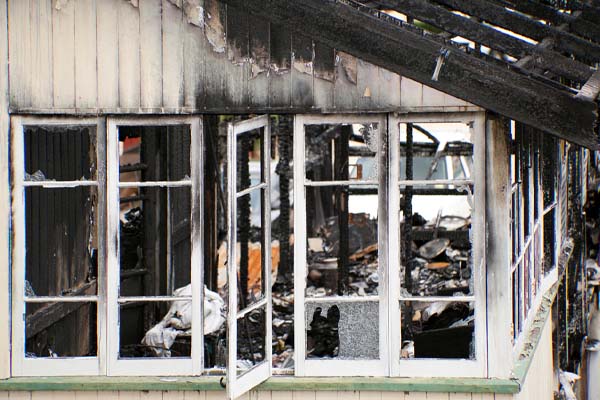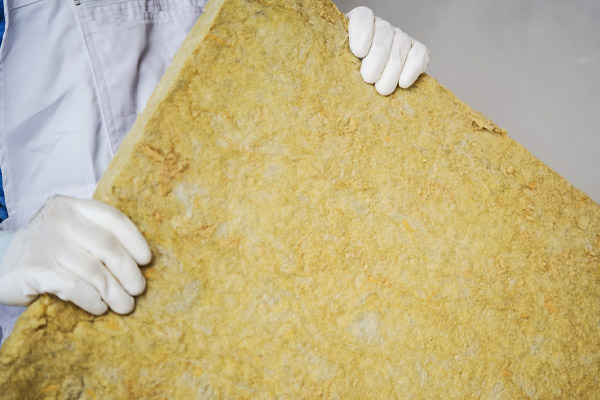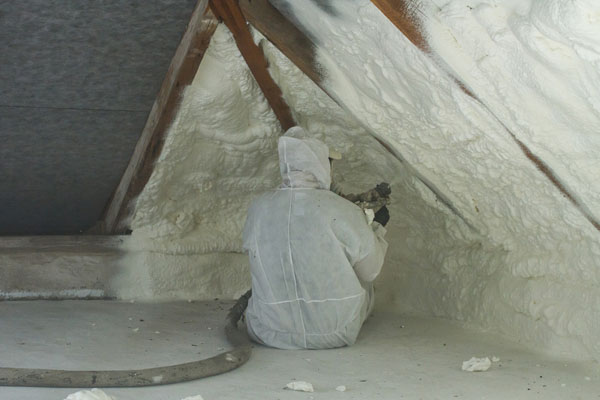Heat of the Moment: Choosing Between Fireproof & Fire-Resistant Insulation

Selecting the right insulation is a critical step in making sure your home or commercial space is safe, energy-efficient, and comfortable. This guide explores the importance of choosing the correct insulation to meet your needs. We will delve into the definitions of fireproof insulation vs. fire resistant insulation, shedding light on their distinctions and applications.
At Ascend Construction, we are committed to providing expert guidance to make informed insulation choices. Whether you aim to enhance fire safety, improve energy efficiency, or achieve optimal indoor comfort, we are here to help you make the right decisions for your space.
Choosing Fireproof Insulation Vs Fire Resistant Insulation In Fort Collins
Contents
Knowing the distinction between “fireproof” and “fire-resistant” is important so you get the right insulation that fits your needs. Read on to know the difference between fireproof insulation vs. fire resistant insulation.
Related Article: Winter Ready: Preparing Your Fort Collins Home with Proper Insulation
Understanding Fire-Resistant Insulation

Fire-resistant insulation is designed to withstand high temperatures and flames. It uses specific materials and structures to provide superior fire protection in various settings. These materials are carefully engineered to resist the spread of fire. Common materials include mineral wool, glass wool, and other non-combustible materials that maintain their integrity when exposed to high heat. They are often used in combination with fire-retardant additives.
Here are some examples where fire-resistant insulation is preferred:
- Commercial and Industrial Spaces: Fire-resistant insulation is vital in these buildings, where safety regulations and building codes demand enhanced fire protection.
- Structural Elements: It is commonly used in wall cavities, ceilings, and floors to prevent the spread of fire and protect the structural integrity of a building.
- Fire Barriers: it is essential to create fire barriers in multi-story buildings to prevent flames from quickly moving between floors.
Fire-resistant insulation provides critical protection against fire hazards and improves fire safety in a building. It can slow down the rapid spread of flames and help occupants evacuate safely. However, it is less effective when it comes to thermal insulation compared to other types. It may not offer the same energy efficiency benefits as standard insulation.
Unveiling Fireproof Insulation
Fireproof insulation is a specialized solution designed to provide the highest level of fire protection. It works by preventing the spread of flames and maintaining its structural integrity when exposed to extreme heat. It is typically composed of mineral wool, intumescent materials, or cementitious compounds that can endure intense temperatures without combusting.
Fireproof insulation is essential in areas like fire-rated walls, fire doors, and spaces that require a two-hour or more fire resistance rating. It offers many benefits, including enhanced safety, reduced property damage, and compliance with stringent fire safety regulations. However, it may come with a higher cost and lower thermal insulation properties than standard insulation.
Related Article: What is the Best Way to Insulate Concrete Block Walls in Commercial Buildings?
Comparative Analysis Of Fireproof Insulation vs. Fire Resistant Insulation

Fireproof insulation uses advanced materials that excel in high fire-risk environments where safety is paramount. It offers the highest fire resistance, providing ample evacuation time and minimizing damage. On the other hand, fire-resistant insulation is suitable for most residential and commercial applications, providing a good balance between fire safety and cost-effectiveness.
The following are the major factors that influence the choice between fireproof and fire-resistant insulation:
- Safety: Safety should be the primary consideration. Higher fire-risk areas require the use of fireproof insulation.
- Cost: Budget constraints may steer choices towards more cost-effective fire-resistant options.
- Environmental Considerations: Sustainability favors fire-resistant materials over fireproof ones, as some fireproof materials are energy-intensive to produce.
Expert Recommendations
- Residential Buildings: Fire-resistant insulation is typically sufficient to meet safety requirements in homes.
- Commercial Buildings: Balancing cost and safety, fire-resistant insulation is recommended for most commercial structures.
- High-Risk Environments: Fireproof insulation is strongly recommended for structures with a high potential for fire hazards to maximize safety.
Related Article: The Hidden Link: Insulation & Your Health
Installation and Maintenance by Ascend Construction

The proper installation of fire-proof or fire-resistant insulation is essential for its effectiveness in safeguarding buildings from fire hazards. Relying on professional installation ensures that insulation materials are correctly placed and adhere to all safety standards.
At Ascend Construction, we help our clients select the most suitable insulation type based on their needs. We carefully assess safety, budget, and environmental considerations so you can make informed choices.
To enhance the insulation system’s safety and longevity, conduct regular inspections and upkeep. This will keep your insulation reliable, offering long-term fire protection for various buildings.
Tips for Making an Informed Choice
- Assess Your Specific Needs: Determine whether the insulation is needed for a residential or commercial setting. The requirements can vary significantly between these two environments, affecting your choice of fireproof or fire-resistant insulation.
- Regulatory Compliances and Industry Standards: Familiarize yourself with local building codes and regulations related to insulation. Make sure that your choice complies with safety standards and legal requirements for your area.
- Seek Expert Advice: Consult insulation experts or contractors who can provide valuable insights into the best insulation type for your needs.
Related Article: Low-Pressure vs High-Pressure Spray Foam: What’s the Difference?
Fireproof Insulation vs. Fire Resistant Insulation FAQs

What is the fundamental difference between fireproof and fire-resistant insulation materials?
The fundamental difference between fireproof and fire-resistant insulation materials lies in their ability to withstand and protect against fire. Fireproof insulation does not burn, while fire-resistant insulation resists fire for a certain duration before breaking down.
How do I decide whether to choose fireproof or fire-resistant insulation for my home or business?
Choosing between fireproof and fire-resistant insulation for your home or business depends on several factors, including your specific needs, regulatory requirements, and the level of fire protection you require. Fire-resistant insulation is usually sufficient for most homes and commercial buildings except for high-risk environments where fireproof insulation is necessary.
Related Article: New Windows or New Insulation: What is Best for Energy Efficiency?
Are there any specific building codes or regulations that dictate the use of fireproof or fire-resistant materials in construction?
Yes, there are specific building codes and regulations that dictate the use of fireproof or fire-resistant materials in construction. These regulations vary by location and are typically set by local, state, and national authorities. Consult local insulation experts for guidance.
What are the key considerations regarding the maintenance and longevity of fireproof and fire-resistant insulation?
The key considerations regarding the maintenance and longevity of fireproof and fire-resistant insulation are professional installation, material durability, sealing and joints, environmental factors, periodic inspections and maintenance, repairs, and timely replacements.
Related Article: The Unexpected Places You Should Be Insulating Your Colorado Home
Can I rely on fire-resistant insulation for high-risk areas, or is fireproof the safer option?
Fireproof insulation is the safer option for high-risk areas, particularly those with valuable assets or where the potential for rapid fire spread is significant. It is crucial to prioritize safety and compliance with fire protection requirements. You can consult an insulation expert for more information.
Conclusion
The decision between fire-resistant and fireproof insulation is critical, with implications for safety, compliance, and cost-effectiveness. It is vital to make an informed choice by considering the specific needs of your building and the level of fire protection required. Consult Ascend Construction for expert guidance tailored to your unique situation. We can help you prioritize safety, adhere to local regulations, and choose the right insulation that will not only protect lives and assets but also offer long-term peace of mind.
Related Article: Important Insulation Information When Buying a House In Fort Collins
Call Ascend Construction For Fireproof Insulation Vs Fire Resistant Insulation Services In Colorado
When it concerns air sealing or upgrading your home’s insulation, consulting with a professional is the best option. However, not all will offer the same quality of service and pricing. Always work with the best one in your area. Residents of Fort Collins, Colorado, and the neighboring area can call Ascend Construction for superior service.
Ascend Construction specializes in insulation removal and installation, air sealing, energy conservation, energy audits, whole-house fan installations, and much more! You can count on us to provide you with service that outshines the rest!

Contact Ascend Construction for a free consultation today. We can provide you with practical solutions to address the problem areas in your Fort Collins home. All of our services are affordable, and our work is guaranteed. Click here to contact us, or click the button below to give Ascend Construction a call. We offer free, no-obligation, in-home consultations.
Ascend Construction
301 S Howes St #1241
Fort Collins, CO, 80521